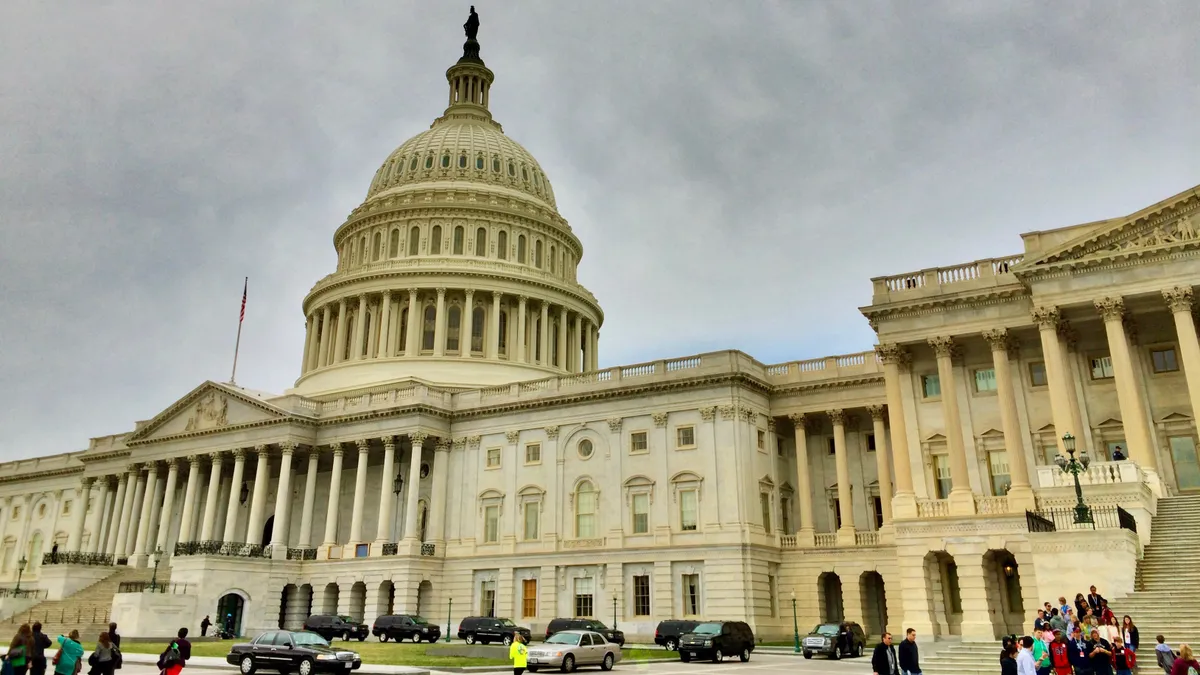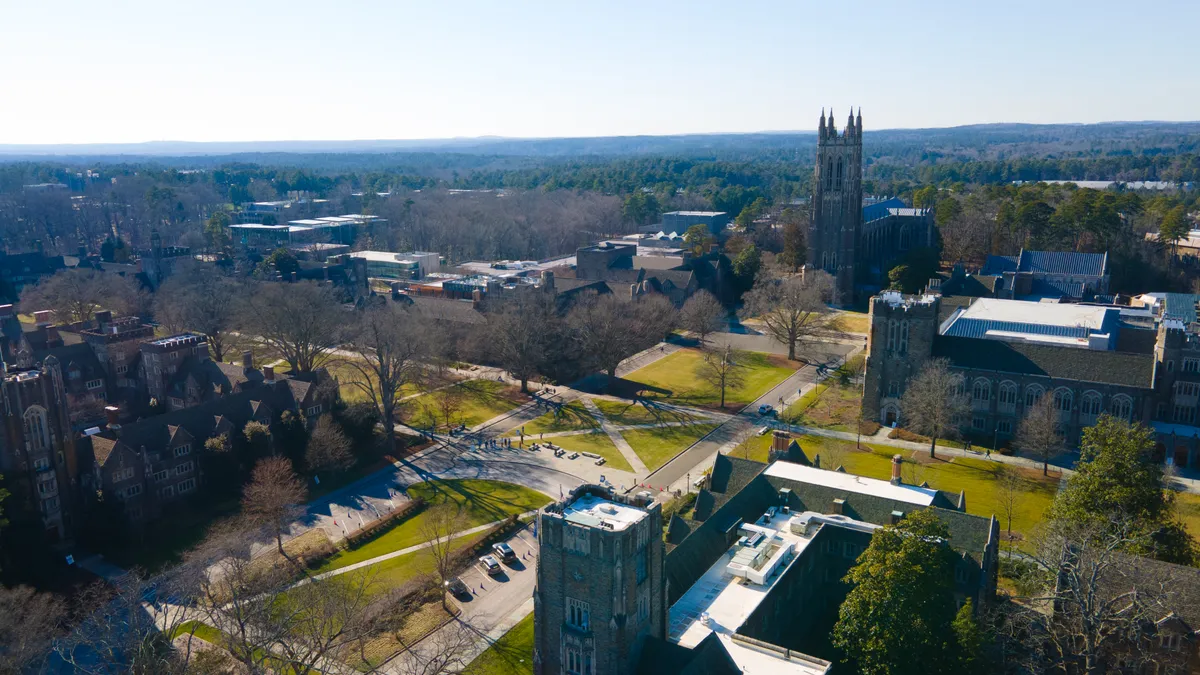The coronavirus pandemic has stalled the American economy for nearly two months and forced campuses to shut down and classes to move online. So far, colleges have secured around $14 billion of the $2.2 trillion Coronavirus Aid, Relief, and Economic Security (CARES) Act to cover their own costs and those of students. But many argue that isn’t enough to compensate for the losses and uncertainty colleges now face.
Leading the charge to secure funding for the sector and make its voice heard is the American Council on Education (ACE). Education Dive talked with Terry Hartle, its senior vice president of government and public affairs, last week to learn more about the group’s relationship with the executive branch and Congress and its priorities for future aid.
This interview has been edited for clarity and brevity.
EDUCATION DIVE: What would you like to see from Congress in a future aid package, beyond just funding?
TERRY HARTLE: We have a wide array of things we're hoping Congress will consider in the upcoming legislation. Providing some clarity on distributions of funds under the CARES emergency grants is one of the items.
We would very much like to be able to serve all students, irrespective of whether they are international students or "Dreamers." But it seems that might not be doable under the current political calculus. Don't get me wrong, we've asked for it, and it's what the vast majority of institutions would like to have the authority to do. But it doesn't seem Congress is likely to go that far.
Still, the way the Department of Education has implemented the CARES Act has excluded millions of students in ways we do not think Congress intended. So we're hoping Congress will provide a little more clarity on that specific point.
How would you characterize your relationship with the department right now? Do you think they've responded effectively to the crisis?
HARTLE: Some parts of the department have been open and accessible and willing to listen. The challenge is that the department is trying to do an awful lot of things very quickly with no real precedent to rely on. In some cases, we think the department has done a really good job, like in getting the CARES funds out for the institutional grants. In other cases, like the student grants, we think the department has done it ineffectively and as a result has excluded students who face financial need.
What else are they trying to do without precedent?
HARTLE: Congress and the executive branch don't have much of a template for anything like CARES. Nothing in living memory is remotely similar to what we are doing now. The country faced huge challenges in the wake of 9/11 and then again after the collapse of the economy in 2008. But this adds a public health crisis to an extraordinary economic downturn. And Congress is moving on multiple fronts to respond.
One thing history teaches us is when the federal government attempts to suddenly implement a raft of new social policies, it doesn't always go smoothly. So there were always going to be problems. And I think we're seeing some of those, such as with the Small Business Administration's Paycheck Protection Program. We've seen them in other areas and I think they will continue.
Has the coronavirus put on hold some of the other initiatives you were working with Congress and the executive branch on, like reauthorization of the Higher Education Act (HEA)?
HARTLE: It's certainly moved everything else to a back burner. One thing about a national emergency is it pretty much obliterates the future. People are only thinking about the challenges immediately in front of them. So a discussion about changes that might be necessary and desirable in any area of public policy will, necessarily, take a back seat to dealing with the challenges of the pandemic and the economic collapse.
Until the pandemic, it appeared Congress had forgotten how to pass legislation. But in the last two months, Congress has passed four supplemental spending bills. Congress has once again figured out how to exercise its most basic function. I think in some ways that opens the door to other legislation going forward.
The underlying political dynamics — the extraordinary level of partisanship — haven’t changed a bit. Congress is going to try to pass at least one more spending bill, possibly more. We can already see battle lines being drawn. Democrats want money to go to state and local governments, Republicans want to enact significant liability protections for businesses that reopened. In the past, that was enough to prevent virtually any legislation from going forward. But what we've seen now is that Congress can put some of that aside.
Do you think Congress should use this momentum to try to accomplish something like HEA reauthorization or other initiatives?
HARTLE: Well, HEA reauthorization is long, long, long overdue. It is extraordinarily difficult to rewrite because it is long and complicated, and doing so is potentially very expensive. And we're in an extraordinarily partisan era. Rewriting any piece of legislation of that magnitude requires either some measure of bipartisan compromise or the single-minded attention of the governing party — but you can only have that if the same party controls all three branches.
We’re not in that particular situation. I think the likelihood Congress would reauthorize the HEA was very, very slim on March 1. I think the chances of a comprehensive reauthorization now are infinitesimal, simply because they're running out of time. The bipartisan consensus doesn't exist.
Then, it appears the Democrats might want to use higher education as an issue in the 2020 election. If that is your intent, you probably don't want to enact legislation the president will sign into law that could be seen as detracting from one of your campaign issues.
It's possible that the current environment could enable some part of higher education reauthorization. Indeed, we're starting to hear that Senate Republicans are interested in putting reauthorization policy-type proposals into an upcoming supplemental spending bill as part of agreeing to more funding for education.
So ideas that enjoy some bipartisan popularity — like simplifying the FAFSA or increasing funding for short-term training programs — could find their way into a federal policy by the end of the year.
How about enacting new Title IX regulations? Is that appropriate right now during the health crisis? (Note: This interview was conducted prior to the rules being released last week.)
HARTLE: We think it's a bad idea to ask colleges and universities to implement what will be the most complex and challenging regulation the department has ever issued at a point when all colleges and universities are closed. The department will expect the regulations to be implemented by the middle of August. It took them well over 900 days to issue the regulations. It's ludicrous to think colleges can implement them in 100 days, when they are closed.
We sent a letter to the department asking them to hold off on issuing new regulations until colleges and universities reopened. We didn't ask, but perhaps we should have, that they give us enough time to put the extraordinarily complicated new regulatory proceedings in place.
What aspects of higher education do you think are going to be permanently altered by the pandemic?
HARTLE: It’s too soon to tell. The COVID-19 pandemic is an epochal event. It's going to affect all aspects of our society in ways we can only dimly perceive. The worst time to speculate what the long-term impact of a crisis will be is when you're still in the middle of it. And so I think it's just very hard to tell how this will play out.
The questions are, quite simply: How soon do colleges reopen? And what sort of distancing provisions become necessary? Are those temporary or long term? How long will it be before a hundred thousand people feel comfortable getting into a Michigan stadium on a football Saturday afternoon?
I think the issue most on the mind of every college and university leader I talk to is: Will we be able to open on schedule as normal this fall?
To the extent they're thinking about changes, they're thinking about how to implement testing, contact tracing and social distancing on campuses. Americans tend to overestimate the speed with which changes will occur. And at the same time, we tend to underestimate the eventual reach of those changes. If we had been talking on Nov. 11, 2001, how many of the changes that we’d be discussing are now commonplace and widely expected?
I suspect that in a similar way, we'll see increased attention to physical safety and distancing and infectious diseases in the wake of the COVID-19 pandemic. Exactly what those changes will be, how quickly they will be put in place, and how readily Americans will adapt to them is unknowable










